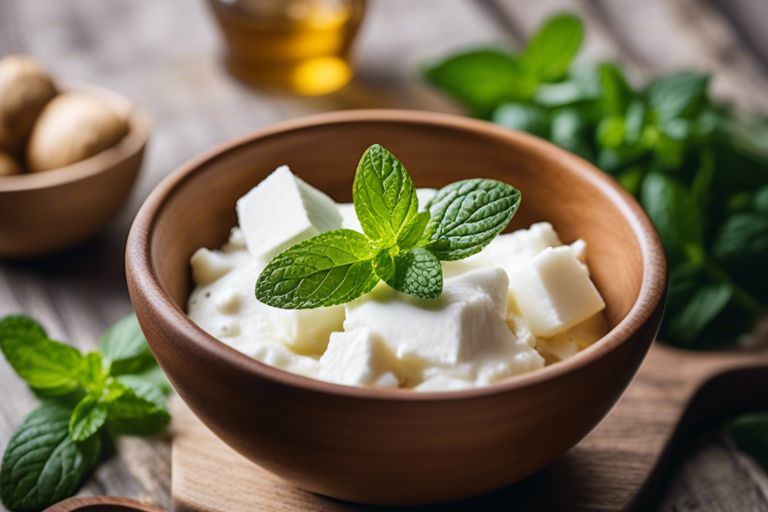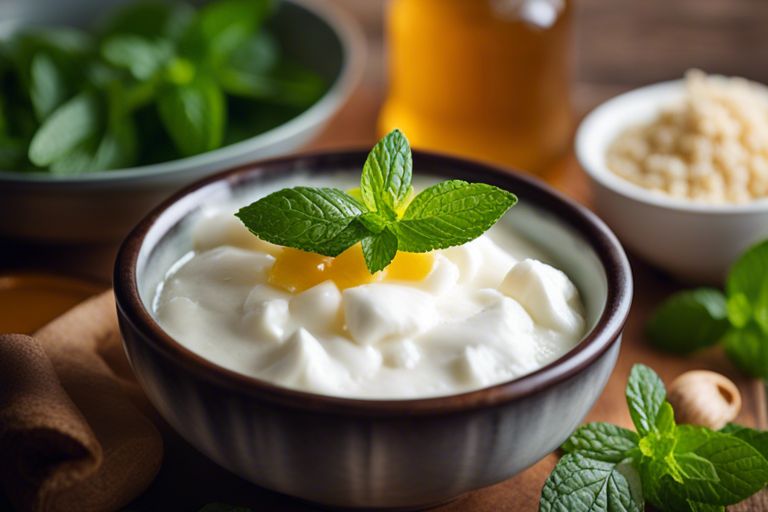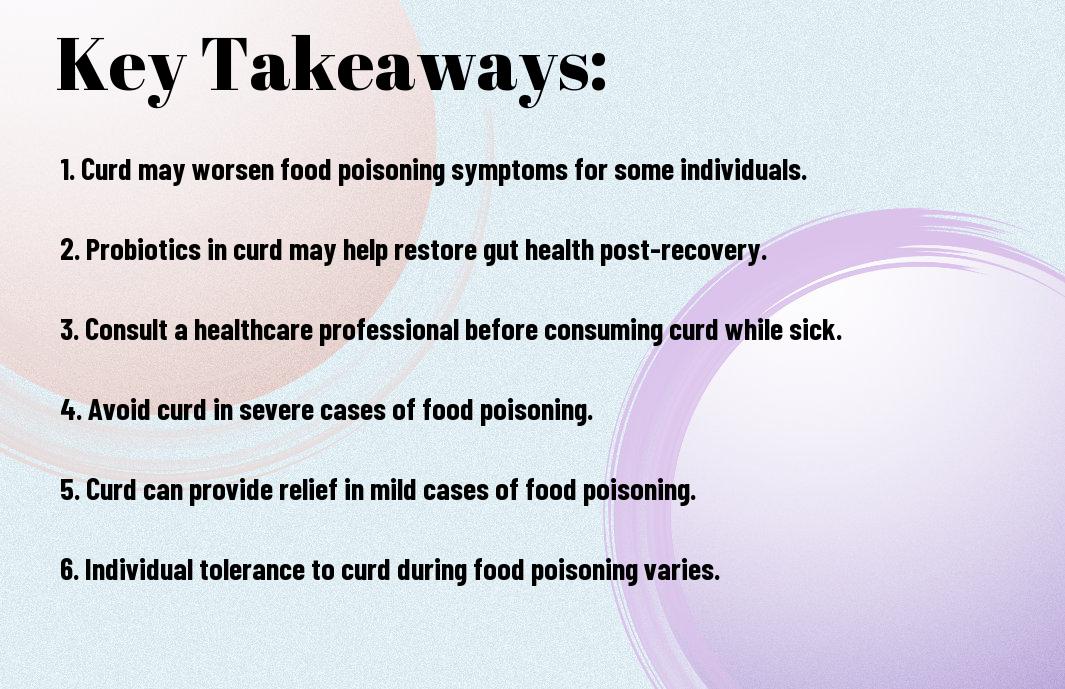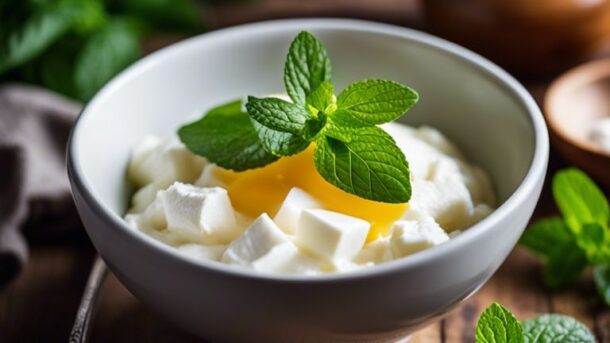Poisoning can be a distressing experience, leaving you wondering what to eat to soothe your stomach. Concerning food poisoning, certain foods like curd can either worsen or improve your symptoms. While curd is generally safe to consume during food poisoning, it’s vital to consider the cause of the poisoning and your specific symptoms before adding it to your diet. Let’s explore whether curd can be your friend or foe when battling food poisoning.
Key Takeaways:
- Curd can aggravate food poisoning: Consuming curd during food poisoning can worsen the symptoms as it is a dairy product that can be difficult to digest while the stomach is already compromised.
- It may not be the best choice: Although some people believe that curd can help in reducing inflammation in the stomach during food poisoning, it is generally not recommended due to the risk of exacerbating the condition.
- Stick to bland, easily digestible foods: When dealing with food poisoning, it is better to opt for bland and easily digestible foods such as plain rice, toast, and clear broth to help soothe the stomach and aid in recovery.
The Benefits of Curd
Before exploring whether you can eat curd when experiencing food poisoning, it’s vital to understand the benefits this dairy product can offer. For centuries, curd has been used as a natural remedy for various health issues, including food poisoning. According to Home Remedies For Food Poisoning – By Dr. Harendra Ji, curd contains vital nutrients and active cultures that can aid in the healing process.
Probiotics and Gut Health
Curd is rich in probiotics, which are beneficial bacteria that support your gut health. These live cultures can help restore the balance of good bacteria in your digestive system, which may be disrupted during food poisoning. By consuming curd, you introduce these healthy bacteria into your gut, potentially speeding up the recovery process.
Soothing Digestive Issues
On top of the probiotics, curd also has a soothing effect on your digestive system. The cool temperature and creamy texture of curd can help calm inflammation and irritation in your gut, providing relief from symptoms like nausea, vomiting, and diarrhea. Including curd in your diet when you have food poisoning may help ease discomfort and promote healing.
With its nutrient content, probiotics, and soothing properties, curd can be a valuable addition to your diet when dealing with food poisoning. Incorporating this dairy product into your meals may help support your gut health and alleviate digestive issues, aiding in a quicker recovery.
Food Poisoning 101
Some instances of food poisoning can leave you feeling miserable, with symptoms ranging from mild discomfort to severe illness. It’s important to understand the causes, symptoms, and common types of food poisoning to protect yourself and your loved ones.
Causes and Symptoms
On occasion, food can become contaminated with harmful bacteria, viruses, parasites, or toxins, leading to food poisoning. Common symptoms of food poisoning include nausea, vomiting, diarrhea, abdominal pain, fever, and weakness. These symptoms can appear within hours of consuming contaminated food and may vary in severity.
Common Types of Food Poisoning
- Salmonella
- E. coli
- Listeria
- Norovirus
Any type of food can potentially cause food poisoning if not handled or cooked properly. Salmonella, E. coli, Listeria, and Norovirus are among the most common types of food poisoning. Each of these pathogens can cause a range of symptoms, from mild digestive upset to serious illness.
| Salmonella | Raw poultry, eggs, and produce |
| E. coli | Undercooked ground beef, raw fruits and vegetables |
| Listeria | Soft cheeses, deli meats, sprouts |
| Norovirus | Contaminated water, ready-to-eat foods |
Recognizing the symptoms of food poisoning and seeking prompt medical attention is crucial in preventing complications and aiding recovery. It is imperative to stay well-informed about food safety practices to reduce the risk of foodborne illnesses.

Can Curd Help in Food Poisoning?
After experiencing the symptoms of food poisoning, you may wonder if curd can aid in your recovery. Let’s explore the potential benefits of curd in dealing with food poisoning.
The Role of Probiotics in Recovery
One way curd may help in food poisoning is through its probiotic content. Probiotics are beneficial bacteria that can help restore the balance of good bacteria in your gut. When you consume curd, you are introducing these healthy bacteria into your digestive system, which may help to improve your gut health and aid in the recovery process.
Curd as a Natural Remedy
Remedy
Another reason curd is considered a natural remedy for food poisoning is its soothing properties. Curd has a cooling effect on the digestive system, which can help calm inflammation and discomfort in your gut. Additionally, the smooth texture of curd can be easy on your stomach, making it a gentle option to consume when you are recovering from food poisoning.
Food poisoning can leave you feeling weak and dehydrated. Including curd in your diet can also help replenish lost nutrients and electrolytes, providing your body with the nourishment it needs to recover efficiently.
How Curd Works Against Food Poisoning
Unlike many other foods that you may be wary of consuming during food poisoning, curd can actually be beneficial. It has probiotics, which are good bacteria that can help restore the balance in your gut and aid in digestion.
Restoring Gut Balance
Balance is key when it comes to recovering from food poisoning. The probiotics in curd help replenish the healthy bacteria in your gut that might have been depleted due to the illness. This can help speed up the recovery process and ease symptoms like diarrhea or stomach cramps. Including curd in your diet can promote a healthy gut environment and support your body in fighting off the toxins.
Reducing Inflammation
Restoring your gut health is crucial in reducing inflammation in your body. Curd contains anti-inflammatory properties that can help soothe the digestive system and reduce any irritation caused by food poisoning. By consuming curd, you are helping to calm down the inflammatory response and give your gut the chance to heal.
Reducing inflammation is important during food poisoning as it can help alleviate symptoms such as bloating, nausea, and discomfort. Curd can be a soothing and gentle option to include in your diet as you recover from the effects of consuming contaminated food.
Precautions and Considerations
Choosing the Right Type of Curd
Choosing the right type of curd is important when considering consuming it during food poisoning. Opt for fresh, plain curd without any added flavorings or sugar. The live cultures present in plain curd can help in restoring the balance of good bacteria in your gut, aiding in the recovery process.
Storage and Handling
An important aspect to consider when including curd in your diet during food poisoning is proper storage and handling. Ensure that the curd is stored in the refrigerator at the recommended temperature to maintain its freshness and prevent the growth of harmful bacteria. Additionally, always use a clean spoon to take out the required amount of curd to avoid contamination.
This will help in preserving the integrity of the curd and reduce the risk of further contamination during food poisoning. By following these storage and handling guidelines, you can safely incorporate curd into your diet as a source of probiotics to aid in your recovery.

Combining Curd with Other Remedies
Once again, when dealing with food poisoning, it is crucial to combine curd with other remedies to aid your recovery. Remember to refer to resources like What to Eat While Recovering From Food Poisoning for a comprehensive guide on food choices during this time.
Herbal Teas and Spices
Remedies such as herbal teas and spices can complement the benefits of curd in combating food poisoning. Herbal teas like ginger or peppermint can help soothe your stomach and alleviate nausea and cramps. Additionally, spices like cumin, coriander, and fennel can aid digestion and reduce bloating or gas, enhancing the overall effectiveness of curd in your recovery process.
Rest and Hydration
One crucial aspect of recovering from food poisoning is rest and hydration. Make sure you give your body the time it needs to heal by resting adequately. Hydrating with water, clear broths, or electrolyte-rich beverages can help flush out toxins and maintain your body’s fluid balance, supporting the curd in replenishing beneficial gut bacteria and promoting digestion.
For instance, sipping on warm herbal teas or consuming hydrating foods like watermelon can further boost your hydration levels and aid in the recovery process alongside curd.

Summing up
Conclusively, when it comes to food poisoning, it is generally safe to consume curd. In fact, curd can help restore the healthy bacteria in your gut and aid in digestion. However, it is important to assess your symptoms and consult a healthcare professional if you are unsure about whether to eat curd or any other dairy products while recovering from food poisoning. Remember to listen to your body and make choices that support your recovery.
Q: Is it safe to eat curd during food poisoning?
A: In most cases, it is safe to eat curd during food poisoning as it contains probiotics that can help restore the balance of good bacteria in the gut. However, if you are experiencing severe symptoms like vomiting and diarrhea, it is best to consult a healthcare professional before consuming curd.
Q: How can curd help during food poisoning?
A: Curd contains live cultures of beneficial bacteria that can help improve digestion and boost the immune system. These probiotics can aid in restoring the balance of gut flora that may have been disrupted during food poisoning, promoting better overall gut health.
Q: Are there any types of curd that should be avoided during food poisoning?
A: While plain, unsweetened curd is generally safe to eat during food poisoning, it is best to avoid flavored or sweetened varieties that may contain added sugars or artificial ingredients. These additives can potentially worsen symptoms of food poisoning and disrupt the healing process of the gut.



